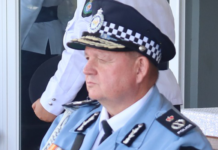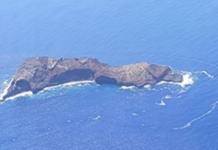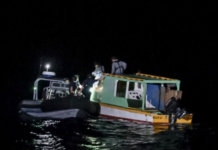Commentary – As tensions escalate between global superpowers, a critical question arises for the Pacific: Where would Tonga stand if China, Russia, and the United States went to war?
This question has become more pressing following revelations that U.S. President Donald Trump, in response to threats from a former Russian president and military leader, Dmitry Medvedev, ordered two nuclear submarines near Russian waters.
In a swift counter, China and Russia launched joint military drills in the Sea of Japan on Sunday, signalling a deepening strategic alliance aimed at challenging U.S. influence.
The drills, known as Joint Sea-2025, began near Vladivostok and involve advanced naval operations including submarine rescue, anti-submarine warfare, air defence, and missile interception. Four Chinese warships, including guided-missile destroyers Shaoxing and Urumqi, joined Russian vessels in the exercises.
These manoeuvres reflect a growing military partnership that has evolved since the first Joint Sea exercises in 2012. While both nations claim the drills are defensive, Japan and other regional powers view them as a serious security concern.
China’s Influence in Tonga
Tonga’s position in this geopolitical triangle is far from simple. The Kingdom has cultivated strong ties with China since the 1990s, when King Tupou IV shifted diplomatic recognition from Taiwan to Beijing.
Since then, China has become one of Tonga’s most influential development partners.
Chinese aid has funded major infrastructure projects, including government buildings, sports facilities, and, most recently, the China-Aid Tongatapu Wind Power Project.
Commissioned by King Tupou VI in July 2025, the wind farm now contributes nearly 4% of Tonga’s annual electricity supply and a quarter of its renewable energy output.
Western Ties Remain Strong
At the same time, Tonga maintains important relationships with Western allies and the United States, particularly Australia and New Zealand, through military training and regional security cooperation. The United States recently re-established its embassy in Nuku’alofa, signaling renewed diplomatic engagement.
Historically, the U.S. has supported Tonga not only through direct funding, but also via international institutions such as the IMF and World Bank.
New Zealand and Australia are Tonga’s largest funders and aid donors.
During World War II, American forces helped defend Tonga from Japanese threats.
Tonga’s Strategic Balancing Act
This dual alignment places Tonga in a delicate position. On one hand, China’s economic support has been vital to Tonga’s development. On the other hand, Tonga’s defence and security as well as economic ties lean toward Western powers.
The Kingdom’s military has trained extensively with Australia and New Zealand, participating in exercises that some analysts interpret as countering China’s growing influence in the Pacific.
Culturally and politically, Tonga is a monarchy that underwent a significant political reform in 2010, transitioning into a democracy. Despite this change—initiated by the late King George V, who wished to relinquish the monarch’s executive powers to Parliament and an elected government—his brother, the current King Tupou VI, has made moves that suggest he is not fully committed to continuing his brother’s vision for a fully democratized Tonga.
As the constitution stands, the King still holds sovereign powers, including authority over foreign diplomacy and the military.
Tonga’s Critical Foreign Crossroads
Tonga must publicly declare its stance on this issue and inform the people which country it would support in the event of war. This is not a time for silence or allowing the public to speculate.
This is also a time for our leaders to deeply reflect on how they make decisions regarding the Kingdom’s foreign policy. Tonga must reassess its approach of leveraging the country’s poverty to seek financial assistance from China, while at the same time maintaining deep-rooted ties with the West.
For over two centuries, Tonga has been profoundly shaped by Western values—its people speak English fluently and embrace democratic principles along with the Western way of life. Today, more Tongans live in New Zealand, Australia, and the United States than in Tonga itself.
Yet, the Kingdom is increasingly turning to China—a nation governed by a Communist doctrine that stands in contrast to Western civilisation—for assistance. Our leaders must understand that the ongoing confrontation between the United States and China is primarily rooted in the clash between democracy and communism.
Modern Warfare Has Changed
Tonga must take this matter seriously. Recent events—particularly last month’s conflict between Israel and Iran—have demonstrated what modern warfare truly looks like.
The traditional tactics of deploying infantry platoons and establishing frontlines are becoming obsolete. Instead, nations now overwhelmingly rely on hypersonic missiles and precision airstrikes using advanced nuclear-capable aircraft, as vividly demonstrated in the Israel-Iran conflict.
This shift has dire implications for Tonga. Should the Kingdom ever become entangled in a conflict involving major powers like the United States, Russia, or China, the threat of a missile strike—capable of reaching our shores within hours—becomes alarmingly real.
For a small island nation with limited defences, this represents an existential risk.







